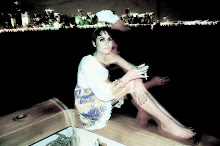
Together we sat and quickly began maneuvering through introductory topics that keep discourse frivolous and the act of being and conquest of knowing shamefully superficial and rather impossible to achieve when paired with the elemental constraints of time. I am not altogether sure whether it was the subjects of our conversation or the exaggerated expression that his eyes embodied which intoxicated me. But I do know that his eyes contained a world within them—that they saw, captured and explained more than what is presumed natural for the human eye. And inevitably, it was the vocality of his emphatic eyes that decided my inhibitions—that persuaded my tongue—that caused me to fall victim to the paradox of our enchantment. It was not that I became damaged from the wake of our exchange, but that a person within myself was destroyed. Destroyed for the better—ruined for good.
Asking me, he said, “But is not a lifetime of journal writing, an oeuvre entirely fragmented by the rapidness of thought and incautious framing of expressed experience and recollection of event? How could a collection of times be regarded as superior text, aside from its aspiration to remain genuine to the behavior within the interior city and the factuality of feeling?”
Growing more comfortable with the question and the reply I would generate, I spoke, “See that is where I have refrained from being classic. I do not know the performance or process of keeping a journal that is bounded by the personal and contains the interior secrets of subjectivity. I have never been that type of writer who unpeels his membrane and discloses his moments of being only for his self to read, judge and relate. Knowing that there will always be someone outside of myself who will be brought into my interior sightings and who will react to the discharge of my disclosed divulgences, changes the direction of my records of time and the processual pace I have them drain from within me. Perhaps my explanation is simply that I am a perfectionist who cannot imagine writing words that fall over themselves and sentences that tumble together. That type of writing would make me fall apart—and I could not consciously let myself do that. Therefore, my lifetime of journal writing has been fragments of performance—an exercise in bettering myself through language or possibly bettering the language that explicates myself. So in one way it has been a practice in perfecting linguistics and in another way, I look back and see a lifetime that has been dedicated to literature. My entries come quite impulsively, but I react to the thoughts that word the phrases before letting them take place and shape on the page. In that sense, I have never lost control of the crafting of myself—each journal entry has contained hope and has concluded with a revelation that is woven within the writing, rather than a product that came after it—each aspires to be a piece of literature, not a capsule I exist within unedited."
Coming up for breath, he stared at me and took over, “So you have managed to make art out of the normalcy of life. You have succeeded in injecting extravagance in the unmurmuring flatness of experiential time. You have taken the title of Storyteller, given it a twist and invented a new role. I now understand the superiority of this oeuvre—it shifts the nerves, it is the cross processing of beings and it redetermines the eye’s and I’s sight. It is awfully sublime.”
Together we sat and spoke within ourselves. Time moved on around us, but we kept back with ease. When the moment was right, I spoke again, “Neither of us should worry though, nothing here has happened that I would like to change.”








No comments:
Post a Comment